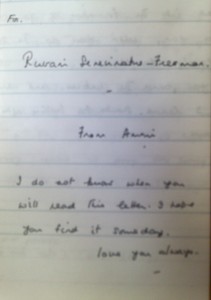A Letter From My Mother
In her book, Autobiography of My Mother (Plume 1997), Jamaica Kincaid writes that witnessing the unfolding of a life from birth onward is the essence of love: “no life is complete, no life is really whole, without this invisible current, which is in many ways a definition of love.” It being mother’s day, I am immersed in thoughts both of what life is now and what life has been before and, as always, it is a day on which I reflect on a year past. I came across these lines from my brother, lines I’m taking from a post he wrote about New Year in Sri Lanka.
These are not the best of times, but surely these are not the worst of times either. Not exactly times of abundance but still times when many small mercies can be remembered and celebrated, across the length and breadth of the land. In the most humble of kitchens there will be a Tamil mother, lighting a lamp, in the humblest breakfast table a Sinhala father would feed his children and they would all, hearts endowed with the fullness of giving offer sweetmeats and plantains to their Muslim, Christian and Burgher neighbors.
Renewal, then, is not about starting with a clean slate after erasing old enmities among family members, but reaffirming solidarities that are ancient, enduring and resistant to the ruptures sought by the intolerant and extreme. It is about the extirpation of poison, from mind and body, community and culture, the water we drink and the earth we rarely walk with the respect it deserves for holding us in all our infirmities and all our vile, human ways.
They reminded me, these lines, of something that has been on my mind a lot, the pain and joy of forgiveness. It is strange that I came across these words today – something that came about because of other things going on in my life each with their own equal magic and unexpectedness – because much of what remained in the wake of my mother’s passing was this wish to forgive and be forgiven.
Not long ago, I picked up a book that my mother had given me seventeen years ago, a book that celebrates motherhood in verse and prose. I was looking for something appropriate to write in a birthday card, to a daughter who was going through a tussle with me. Out of this book slipped a letter that my mother had written to me five years after that, a letter that I had not seen. In it she writes of what she was doing at the time, where I was (asleep after a first coffee and dessert sojourn in the wake of a five month old), and where she was and what she was doing (on the pull-out couch, in low-light no doubt, reading and writing down things she liked). This is always how she began letters – putting me where she was, her frame of mind, her surroundings, and then of course her thoughts going this way and that, often difficult, often tortured, veering between love and despair. But in this note she had pointed me toward a particular passage in this book that she hoped I’d read, an excerpt from the diary of novelist and Bronte biographer, Elizabeth Gaskell:
To my dear little Marianne I shall ‘dedicate’ this book, which, if I should not live to give it to her myself, will I trust be reserved for her as a token of her Mother’s love and extreme anxiety in the formation of her little daughter’s character. If that little daughter should in time become a mother herself, she may take an interest in the experience of another; and at any rate she will perhaps like to become acquainted with her character in its earliest form. I wish that (if ever she sees this), I could give her the slightest idea of the love and the hope that is bound up in her. The love which passeth every earthly love, and the hope that however we may be separated on earth, we may each of us so behave while sojourning here that we may meet again to renew the dear and tender tie of Mother and Daughter.
I could say it was strange that these sentiments were exactly those that I wished to pass on in that difficult moment to my own daughter, these words that acknowledge the fact that this relationship between mother and child will not always be easy – that there will be reason to forgive and be forgiven – but will always contain the divinity of a particularly lasting love. I could say that it was surreal the way they came to me when I needed them in a letter written by my mother before she passed away, and read twelve years after she had set them down. But I’ve come to believe the answer I give to my daughters when they ask me “how did you know?” Because I’m a mother. I’m magic. There is no other explanation for it than that, the way a mother knows in life and in life after life.


